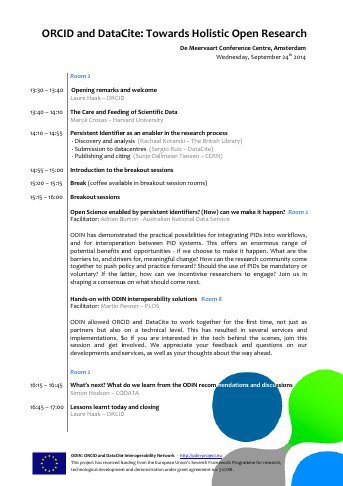ODIN’s second year has provided new insights as well as new developments regarding persistent identifiers. We have updated our material section with new documents, where you will find new information: checklists, recommendations, proof of concept examples…
ORCID and DataCite: Towards Holistic Open Research
ODIN’s final event took place the 24th September 2014 at the De Meervaart Conference Centre Centre in Amsterdam, from 13:30 to 17:00, collocated with the 4th Research Data Alliance Plenary.
We invited all those interested in research data citation, management, policy, evaluation and systems to join us for the event. We were delighted that additional context and experience were provided by the keynote speakers for the day, Dr Merce Crosas, Director of Data Science at IQSS, Harvard University, and Dr Simon Hodson, Executive Director of CODATA.
The final agenda is available
Great to see you all in Amsterdam!
Second data webinar: After ODIN – looking to the future
On September 9, 2014, the ODIN team hosted its second data webinar, where we discussed the detailed gap analysis generated during the project and the recommendations for the most urgent steps to overcome them. Moreover, the invited speakers talked about the future and how the would use the recommendations to build solutions for their communities.
If you couldn’t join us, all the talks are already available in our Webinars section!
ORCID and DataCite sign an MoU
Thanks to the ODIN collaboration, bonds are being strengthened.
ORCID and DataCite are pleased to announce their joint commitment to research data by signing a Memorandum of Understanding. ORCID and DataCite agree that data are essential building blocks of scholarship and research in the sciences, medicine, social sciences, and humanities. Researchers and scholars recognize the potential for increasing collaboration and synthesis when data are archived, published, and shared, forging the possibility for new discoveries built upon prior work. This vision requires that data be discoverable, citable, and connected to the people who created it. Reliable persistent data and researcher identification are essential to establish these links.
The two organizations are working together to improve and harmonize DataCite and ORCID metadata schemas for data and researchers, to develop new interoperable and open source APIs for our services, and to create complementary user services.
Follow our OR2014 panel on-line!
If you are not in Helsinki today but you want to follow the ‘Promoting Interoperability and Services Through Shared Identifiers’ Panel, at 11:15AM GMT+3, you can do it through Adobe Connect here:
https://connectpro.helsinki.fi/or2014_parallel1/
You will find more details about the panel in the OR2014 website and in our Conferences section!
Looking forward to the OR14 Developer Challenge!
The ODIN delegation are arriving in Helsinki to participate in OR14, and the technical team are very excited about the Developer Challenge. The recent ODIN Data Webinar was a huge success, and has hopefuly served to whet your appetitie for building something new with us. The slides also contain a huge number of useful links toORCiD and DataCite resources, so do take another look.
Our previous codesprints have produced some very cool stuff indeed, and we’re looking forward to being surprised all over again by the creativity and ingenuity of the OR developer community.
Just to stimulate a few ideas, and to add to your toolbox, there are a few resources and some already-existing code that might be useful…
Tom Demeranville has written a Java ORCiD Client that should be useful for any Java developers out there. It models the public API and a few other things, including OAuth and updating works. There’s documentation on github and it’s available via Maven.
There is also a good resource in the ORCiD popular client libraries which might serve to spark off a few interesting thoughts… And you can check DataCite’s Dev Challenge dedicated page as well!
In case you need any more inspiration, here’s a non-exclusive list of possibleareas on which to focus:
- Data author discovery or disambiguation
- Tracking institutional output
- Curation or collaboration tools
- Linking related research objects
- Tracking of citations or alternative metrics to data
- Allowing personal repositories to take advantage of ID systems
See you in Helsinki, and happy coding!
First ODIN Webinar
On June 4, 2014, the ODIN team hosted a data webinar, demonstrating the APIs, tools and resources available to help anyone interested in building on ORCID and DataCite services. We also showed off some of the innovative possibilities created by the project, with a demonstration of the proof-of-concept tools built at CERN to serve the High-Energy Physics community.
We were delighted with the response to our invitation to the webinar, and more than 120 people joined us on the day. Many others wanted to attend but could not, and to serve this group, as well as attendees who have asked to access recordings and materials from the webinar we have made the video recordings of the webinar presentations available here.
Thanks to everyone who joined us and helped to make it such an interesting session, and watch out for members of the ODIN team at Open Repositories 2014 in Helsinki next week, where we will be actively participating in the developer challenge and participating in a plenary panel session.
The videos and slides are already available in our Webinar section!
